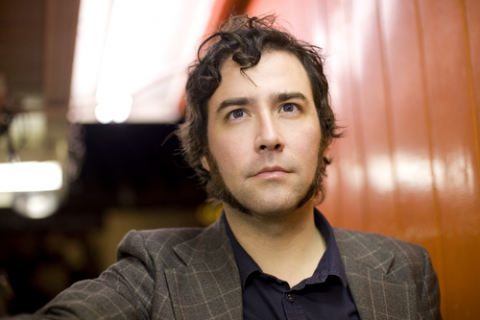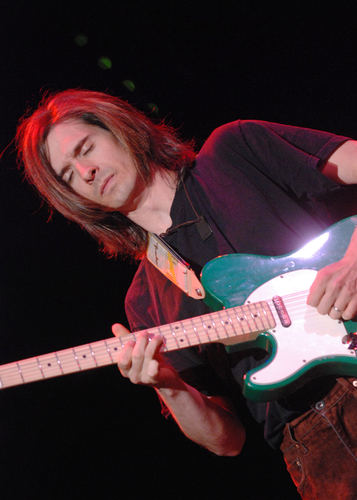When Album Funding's a Crowd

Bleu '96 tapped fans to fund a publicity campaign for his new album <em>Four</em>—and succeeded beyond all expectations.
Photo provided by the artist

Faculty member Scott Tarulli raised $5,130 for his third album via fans on Kickstarter.
Photo by Phil Farnsworth
With the traditional music industry in tangles, it takes a village to make an album. Now that social media is par for the course, Berklee students, faculty, and alumni are experimenting with new ways to leverage their online networks to provide financial, not just moral, support. They're taking projects into their own hands—and their fans'—with crowd-sourced funding.
Take the DIY music industry sensation Kickstarter, a website that allows anyone to raise money for a creative project. It's an all-or-nothing endeavor: If the fundraising goal isn't met, the creator doesn't get anything at all. Artists typically offer premiums to encourage contributions, such as copies of the album, collections of rarities, and private concerts. According to the Kickstarter website, just under half the projects succeed.
Berklee affiliates seem to have more success than the average. Alumni from a range of genres have met their goals: roots band Annie and the Beekeepers, songwriter Lijie, experimental jazz musician Zach Mangan, Jewish music educator Jay Rapoport, and bassist Matthew Rybicki. So have student Lauren Grubb and faculty guitarist Scott Tarulli, who raised $5,130 in September to record his third album. And Five-Week Summer Performance Program student Tristan Allen got a recording session funded by fans of his new pal, alt-cabaret star Amanda Palmer.
The most smashing Berklee success so far has been by '96 songwriting grad Bleu. He aimed to raise $8,000 to cover a small distribution and publicity campaign for an album, Four, he already had completed for self-release. In a mere 12 hours, he beat the goal. At the end of the 45-day period, he'd raised almost $40,000. "We were all shocked," he said.
How did he do it? "Sincerity is a key factor. I think it sort of has to ring true. You have to tell a compelling story," Bleu said. (See his in the video embedded below.) He's backed campaigns himself and welcomes the opportunity to support an artist directly. As he said in a Hypebot interview, "I'd much rather be owned by my fans than by a record company."
But while anyone can put their heart into a project, not everyone has the connections. Bleu chalked the success up to the longstanding relationships he's built with fans, both online and in person. "I've been at it for a long time," he said. That knowledge of his fan base—and his day job as a songwriter and producer—also meant he knew what special extras might impel them to dig a little deeper, such as a custom-written birthday song.
That may be one reason Berklee students who know about Kickstarter aren't jumping to take advantage of the site, thought Evan Kramer, editor of the student-run Music Business Journal.
"It is kind of hard to generate fan funding," Kramer said. "You really have to be established and you have to have an audience that's interested in the product." You also need to have a finished product to sell in the first place. Many student artists just aren't far enough along in their careers to take full advantage of the site.
That said, Berkleemusic.com is offering a course that may speed up the process. Topspin is a new platform for direct-to-fan music marketing and sales—helping artists both build their networks and leverage them for tickets and albums. There's no up-front fee; the company makes money when its users do.
You can create sales widgets that "can be embedded anywhere on the internet," said Mike King, director of marketing for Berkleemusic.com. The suite has powerful analytics that let users, for instance, reach out to fans with the most Facebook friends. "It crawls all the blogs looking for your name. . . it crawls Twitter."
However, Topspin isn't open to everybody yet. Unless you're at the level of Paul McCartney, who uses the suite, your only option is to be represented by one of the company's partners—or to sign up for the Berkleemusic course Online Music Marketing with Topspin.
About 240 students have taken the college's course, Online Music Marketing with Topspin, this year, King said. The next session starts Jan. 10, 2011.
Through the course, Berkleemusic student Sheila Hash used the platform to set up house shows for the band Crush Luther, according to a roundup the Topspin team wrote. Any fan can request a show through the platform; Hash then uses Topspin to sell tickets for the event. Fans, shows, money: bingo.
And students at the Boston campus, immersed in improving their craft full-time, are building their careers the old-fashioned, newfangled way, said Kramer, who recently wrote an article with King about Kickstarter. "There's definitely some do-it-yourself innovation going on," he said. Student bands are trying to create buzz by gigging, promoting their demo, using social networks, and releasing free tracks as teasers to get people to come to gigs and buy recordings. Perhaps it will all lead to new models of success—DIY for Generation Y.
